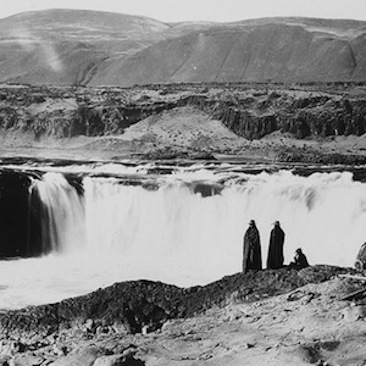The nearby Safeway grocery reigns as my epicenter of oddity. Tonight, while waiting to buy bananas, I watched the guy in front of me pay for two big bags of potatoes. He didn’t answer the cashier’s pleasantries. When three pennies slid from the change machine, he flicked them onto the end of the counter, as if so much trash, and left. Outside, he was standing at the trunk of a sports car parked in front of mine and wrapping a rag around his hand. He briskly wiped down the rear bumper, the driver’s door handle, and things inside I couldn’t see. Was he keeping his ride immaculate or wiping away fingerprints? Not keen on him seeing me stare, I left before his work was done.
Why does the mind, acting independently of its owner, insist on attaching significance to coincidences for which chance is the only plausible explanation? Or if not attaching significance, then automatically sketching out possible narratives that have no basis in fact?
These questions and many others linger after a day of coincidences. First up: Driving to an appointment yesterday, I listened to Terry Gross interview actor and comedian Denis Leary on NPR. The news, he said, produces a treasure trove of material for jokes. Example: Heather Mills’ allegations during her divorce from Paul McCartney that the former Beatle didn’t accommodate her special needs as a leg amputee. Taking this in, I look up and see the Oregon Artificial Limb Co., established in 1906. What are the chances? This must mean something — for me. But what? And off the mind goes. . .
Later, I was walking several blocks from my house and passed an intersection with an odd juxtaposition of businesses: a liquor store, an adjoining low-budget funeral home, and across the street a building where I had long assumed abortions were performed. Such services offered within remarkably close proximity had always struck me as having some broad message about life and death. But what? Or was the juxtaposition merely an accident of zoning or vagaries of the rental market? At home I decided to learn more about the Pregnancy Resource Center. It turns out that abortions aren’t performed there. In fact, the enterprise tries to persuade young women not to have abortions. Read More
The flowers are gone. So are the candles, hand-scrawled notes, and other remembrances that for months crowded the sidewalk beneath a sign advertising passport photos. But the story they told is still with me, replayed every time I pass the intersection of NW Glisan and Broadway in Portland. It’s where a TriMet bus ran down five pedestrians in the crosswalk just before midnight on a Saturday last April, pinning three beneath the bus. Two young women were killed and a young man was badly injured.
Passing through the intersection several times each week, I see the accident and its aftermath play out in my head as if filmed with an old hand-held camera, the images dark and flickering and grainy. The people in these frames had no inkling that tragedy was about to strike. The pedestrians and many others nearby had just left a comedy club. Laughter was in the night air. The bus driver was ending her shift. Soon, emergency workers found themselves comforting victims trapped beneath the 17-ton bus.
This morning as I glanced at the empty sidewalk where the memorial had stood for months, the sun was shining and people streamed by in cars and on bikes, everybody headed somewhere into futures they can’t foresee. I wondered how many, like me, saw a horrific past that is still very much present.
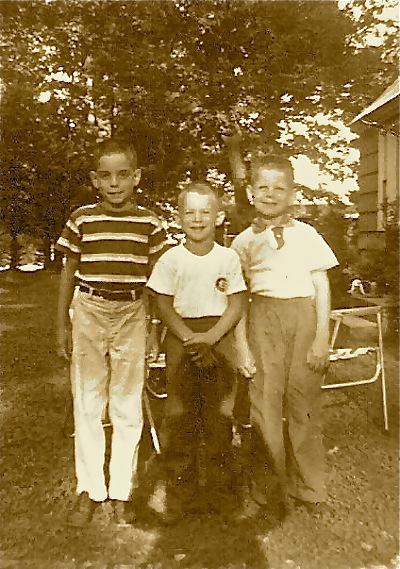
Some photos haunt me. None more than this one. It was taken behind our house in Nashua, New Hampshire, circa August 1958, seven months before our family moved to Florida. My two brothers and I posed for our mother, and judging from our expressions, we hadn’t yet reached the stage of reflexive smart-ass resistance to any family formality.
Thanks to technology at the time, she had to shoot the image while holding the camera at her waist and looking down at the view finder. (This camera looks familiar to what she used in those years, familiar at least to a memory clouded from a half-century and more gone by.) Thus her shadowed figure also looks posed, the image of someone watching us rather than an amateur photographer guilty of a common composition error. With no outline of her hands holding the camera, it’s easy to imagine them clasped in front of her over a late summer dress, and her eyes cast not downward but fixed on her sons.
What prompted the photograph, the mood of the moment, and what was happening in our lives that day are questions whose answers — likely inconsequential — are gone forever. I’m certain that our mother never pictured me staring at the photo so many decades later, enthralled not with our youth or our brotherhood or the memories her snapshot awakens. What haunts me now is the accidental but enduring vestige she bequeathed. Not merely a shadow persisting on faded film long after her death but a presence hovering over us still, a presence always there, no matter the location, no matter the light.
Forty-one years after the fact, I’m still incensed that John Wayne won the best actor Oscar for his starring role in the ho-hum True Grit, despite Dustin Hoffman’s mesmerizing portrayal of Ratso Rizzo in Midnight Cowboy. But after watching the trailer for an upcoming Coen brothers remake of True Grit, starring Jeff Bridges in the role that Wayne played, I might end up forgetting this cinematic injustice. But I’ll never forget the unlikely bond that Rizzo developed with Joe Buck, played by Jon Voight, who was also nominated for best actor. The loyalty and friendship — love, actually — between these down-and-out strangers remains palpable all these years later. As palpable as Rizzo’s unfulfilled yearning to feel the Florida sun on his upturned face.
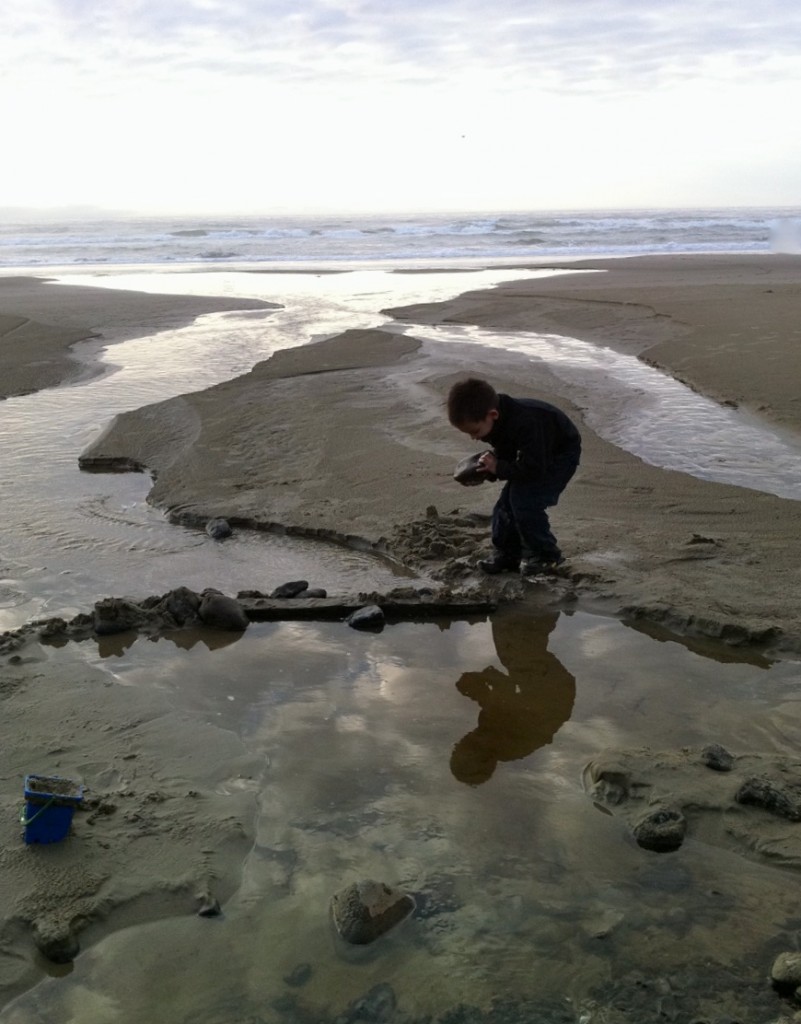
We try not to over-indulge our five-year-old son. Still, Atticus has ended up with many more things than any kid can keep track of, much less play with. I could haul away all his toys, and he wouldn’t complain — as long as he was lording over this small creek winding its way to the Pacific Ocean. Each day of our Oregon coast vacation last week, the creek was the center of his universe. At night he wondered whether the dam he built was still there. He wanted to know where the water comes from and ends up. (China seemed an acceptable answer.) He wanted to put a note in a bottle and send it seaward.
Now, back in the humdrum of our routine existence, I could offer to buy him any of the 1,361,605 toys sold on Amazon.com. No doubt he would prefer instead the sand, flowing water, rocks, and freedom to shape them as he wishes. Or do they shape him?
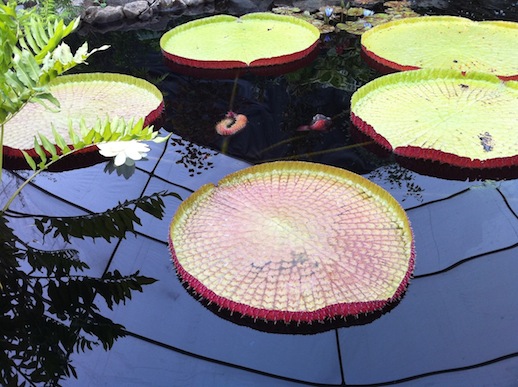
September 15, 2010
A sudden medical problem nearly a decade ago made me afraid I was going to die on the spot. Inside a Costco of all places and near a woman cooking meat samples. Croaking at Costco wasn’t my idea of death with dignity, especially with shoppers rushing past to score the woman’s free food. They looked as if a corpse sprawled in the aisle wouldn’t deter them. Luckily the symptoms faded, and I finished my shopping trip.
Today, strolling through a nursery that supplies plants for my small but lush goldfish pond, I thought again of death. If everything ended now, this would be a fine and fitting place. A brief item in the newspaper would read: “Police said nursery workers at Hughes Water Gardens found him in a greenhouse, floating face down among giant tropical lilies. When they turned him over, he was smiling.”
Who wouldn’t prefer a last breath scented with the earthy smell of water alive with greenery rather than that of sizzling fat at Costco? Or see as a last sight the veined symmetry of Victoria lily pads rather than the meat cooker’s inadequate hairnet? Then again, no one gets to choose.
“It’s his time.” A doctor said this twenty-three days ago. He was speaking to my father’s wife and one of my two brothers. Down the hall in the emergency room, Dad was slipping away.
Gazing into still waters aglow with exotic plants and flowers, I wanted to see a reflection of his face, not mine. I wanted to go back fifty years, back to our lake, my brothers and I kids again, taking turns launching from Dad’s slippery shoulders. I wanted to see him looking skyward, squinting into the sun to follow my arc, the rise and fall that he began. But I felt only a memory. It was his skin that I remembered.
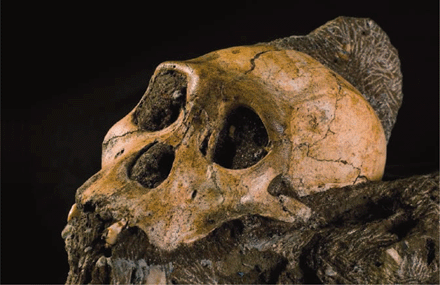
April 8, 2010
News about the discovery of two mostly intact skeletons from nearly 2 million years ago focuses on claims that they represent a previously unknown branch in the human evolutionary tree. I appreciate the potential significance of Australopithecus sediba, as the middle-age woman and adolescent boy have been dubbed. But my focus keeps drifting to questions whose answers, forever out of reach, would never make news.
What made the pair, possibly mother and son, fall into a South African sinkhole littered with bones of saber-tooth tigers and other animals? With brains one-quarter the size of ours or less, what hopes and dreams did they — or could they — harbor? If they experienced terror before their fatal fall, was it fear any different than our own? Too bad archeologists can’t unearth thoughts and feelings along with tangible evidence like bones.
This much is certain: in dying many millennia ago, this woman and boy with human and ape-like features may have secured a lofty spot in history, an accidental achievement as incomprehensible to them as the universe is to us. So why care? Despite long odds, our lives might find purpose long after they end.

April 7, 2010
Stumbling upon intersecting observations by two writers today, I was reminded of a vacation several years ago at the Olympic Peninsula’s northwestern tip. I was drinking coffee in the lobby of a lodge. A new guest was checking in. The innkeeper, making small talk, asked what he did for a living. “I work for Duke Energy in North Carolina,” the man answered. With barely a pause he added, as if reading from his business card, “And global warming has nothing to do with carbon emissions.” I regret not asking him what that day’s crystalline sky would have looked like if CO2 was pink instead of invisible.
The writers who triggered that memory are Elizabeth Kolbert of the New Yorker, whose 2006 book, Field Notes from a Catastrophe, slapped me awake to what we’re doing to the planet. The second is by Marilynne Robinson, the acclaimed novelist whose new work of non-fiction, Absence of Mind, tackles science, religion, and human consciousness. Read More
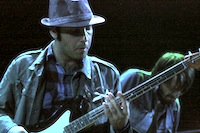
April 6, 2010
A song whose foreign words I don’t understand grabbed me recently and won’t let go. The Afro-pop music by Fool’s Gold is so mesmerizing that I had never wondered about the lyrics, though Luke Top’s voice is melodious as an instrument. I’ve played the song dozens of times, often consecutively. Uplifting yet plaintive,”Ha Dvash” takes me somewhere better. Especially the guitar solos.
Not until today did I learn that “Ha Dvash” is sung in Hebrew. The title means “The Honey.” I’ve only found a translation of one verse, courtesy a reviewer who’s as taken with the song and Fool’s Gold as me. That verse is beguiling enough that I’ll have to buy the Los Angeles band’s CD, which comes with track translations:
I have no time to kiss you; I only have time to fall apart. I have time to drink from the faucet and dream of the honey.
Learning the lyrics will come with a risk: “Ha Dvash” may never feel the same again.
Florida urologist Jack Cassell doesn’t want to treat 69,438,983 Americans. “If you voted for Obama. . . seek urologic care elsewhere,” reads a sign outside Cassell’s office in Mount Dora, reported the Orlando Sentinel, a newspaper I helped edit for much of my adult life.
Think of how shunning Obama backers could spread. When I next visit Orlando to see family, will restaurants owned by Republican zealots refuse to serve me? But this is about something much larger. Cassell is expressing revulsion for 52% of those who voted because of our political views. The revulsion is so rabid that the doctor prefers not to talk to us, not to touch us, not to treat us. For a change, a racial minority isn’t facing discrimination but rather a racially diverse majority.
Let me be the first to coin a word for this practice of avoiding, at all costs, fellow citizens who disagree politically with Republicans: Cassellism. I can already see bumper stickers, such as Proud To Be A Cassellist! and I ♥ Cassell.
A Cassellist version of the modern Hippocratic Oath is also inevitable:
I will remember that I remain a member of society, with special obligations to all my fellow beings McCain voters. . . May I always act so as to preserve the finest traditions of my calling, and may I long experience the joy of healing those Republicans who seek my help.
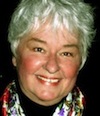
As guest curator for a recently opened exhibit, “Tall in the Saddle: the Pendleton Round-Up at 100,” I worked with dozens of people across the Northwest. Sometimes the project intersected with the creative work of others. Among them was fine artist Shirley Morris of Bend, Oregon, who’s making a documentary that I’m eager to see. It’s about the cowgirls who starred in rodeos early in the last century. Not only did Shirley tailor an excerpt of her film for the exhibit, she also helped lead me to artifacts — personal items that belonged to one of the most famous cowgirls, Bertha Blancett.
The cowgirls, America’s first professional female athletes, performed around the world to huge audiences. They were tough and often glamorous. These “bucking horse suffragettes” represented new freedoms that women claimed for themselves even before winning the right to vote in 1920. Shirley’s film, Oh, You Cowgirl!, will illuminate the lives of women who in her words “left a legacy so steeped in American lore, you wonder, ‘Could it be true?’ ”
I’ll be among the first to buy the DVD. Here’s the trailer:
[youtube]http://www.youtube.com/watch?v=NyprQ4VVcOw&feature=player_embedded[/youtube]

Forests and cliffs along a finger of Puget Sound replace scenes from my city life. I’m driving north, Highway 101, enjoying glimpses of water reflecting gray sky. Then a small roadside cross blares a silent message: Fatal Crash Happened Here. Questions come in bursts, and the mind answers with gory images. Did the car flip? Trapped victims? And so on.
People mark spots like this to memorialize friends and family killed in an awful, pointless way. But why not honor the dead in private? Why does death by traffic accident warrant public displays that pull strangers like me into pasts not their own? Of course I might think differently about these crosses if my family, in the car with me, perishes in a wreck around the curve ahead.
Passing another cross a few miles later, I force myself to picture not bodies in mangled cars but the rented cabin that awaits us near Port Townsend on Discovery Bay. In this envisioned future, tips of snowy Olympic Mountain tops peek down at a deserted tidal flat. I’m walking amid scattered shells, where the incoming tide will wash away my footprints.









